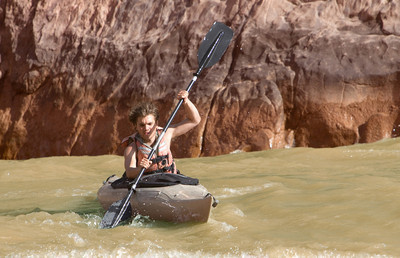‘Into the Wild’

Some people march to a different drummer. And sometimes that march leads them where they should never go.
That’s exactly what happened to Christopher McCandless. But knowing his journey’s outcome wouldn’t have stopped him from making that journey.
As a result, sharing McCandless’ odyssey in “Into the Wild” makes for a sometimes exhilarating, sometimes harrowing — but always compelling — moviegoing experience.
And for that, we have Sean Penn to thank.
If Christopher McCandless had been around in the ’70s instead of the ’90s, future Oscar-winner Penn might have portrayed him.
Instead, Penn spent a decade trying to get “Into the Wild” onto the screen, directing his own adaptation of Jon Krakauer’s best-seller, which chronicles McCandless’ unstinting, unsettling march toward a fateful solitude.
Most young men in his position would have followed a different — and much more familiar — path.
A son of privilege whose parents (William Hurt, Marcia Gay Harden) beam with pride as he graduates from a prestigious university, Chris (Emile Hirsch) shares his plans to enroll in law school.
At least that’s what he tells his parents. After all, they’ve lied to him all his life, so why shouldn’t he follow their example?
Instead of heading back to school, however, Chris donates his life savings (more than $20,000) to charity, instructing them to “feed some people,” and hits the road.
Inspired by chuck-it-all writers from Henry David Thoreau to Jack London, Chris — who dubs himself Alexander Supertramp — has had it with the hypocrisy and strife of contemporary American life. Or at least life as it’s lived at his house — even if it means stranding his sensitive sister (Jena Malone) there without a kindred spirit to share the pain.
Chris plans to find his refuge somewhere in the wilds of Alaska, forging a truer existence amid the harsh purity of America’s Last Frontier.
But Chris has miles to go before he reaches his ultimate destination. Whether riding out a flash flood in the desert kayaking down the Colorado River — without a clue, let alone a permit — he’s game for anything, confident that every experience, every encounter, represents a vital step on his journey toward enlightenment.
The people he meets along the way — some of them, anyway — justify his expectations.
He finds a surrogate mother in a wandering hippie (Catherine Keener, radiating rueful warmth). A genial South Dakota farmer (a hearty Vince Vaughn) serves up big-brotherly life lessons while teaching Chris how to till the wheat fields. And a grizzled desert rat (Hal Holbrook, in an Oscar-caliber performance of quietly burnished emotion), who’s been alone so long he’s almost forgotten what it feels like to love or be loved, gives Chris the kind of unspoken affection and gentle wisdom he never got from his parents.
And as we accompany Chris on his wanderings, we wonder why someone with his gift for touching lives is so determined to live — and, as it turns out, to die — alone.
Chris McCandless may romanticize his yearnings, and his wanderings, but “Into the Wild” does not.
It’s a crucial difference, enabling us to understand Chris’ impulses even as we see the misguided naivete behind them.
To that end, Penn creates a three-part narrative structure, interweaving the parallel strands so each enriches the other. The first follows Chris’ two-year road experiences. The second focuses on his Alaskan adventure as he takes up residence inside an abandoned Fairbanks city bus parked somewhere near Denali National Park.
The third illustrates what Chris is running from: the strife and recrimination that characterize his parents’ relationship.
Penn taps into Chris’ idealism with palpable intensity, exploring themes he’s addressed in previous movies — especially life-and-death, revenge-or-redemption questions that surfaced in his directorial efforts “The Crossing Guard” and “The Pledge.”
In the process, Penn contrasts Chris’ spirit of adventure with nature’s implacable power, aided in no small measure by “Motorcycle Diaries” cinematographer Eric Gautier.
That movie followed the young Che Guevara through South America, capturing the spark that ignited his revolutionary fervor.
But there’s more to Chris’ journey than rebellion. And Hirsch’s quiet virtuosity conveys not only his character’s physical transformation (from rugged vagabond to emaciated loner) but, more importantly, his psychological one.
Hungering for a genuine spiritual awakening, Chris yearns to discover himself as he discovers the world. By the time he figures out that “Happiness is only real when shared,” however, it’s too late for him to share anything — except his story.